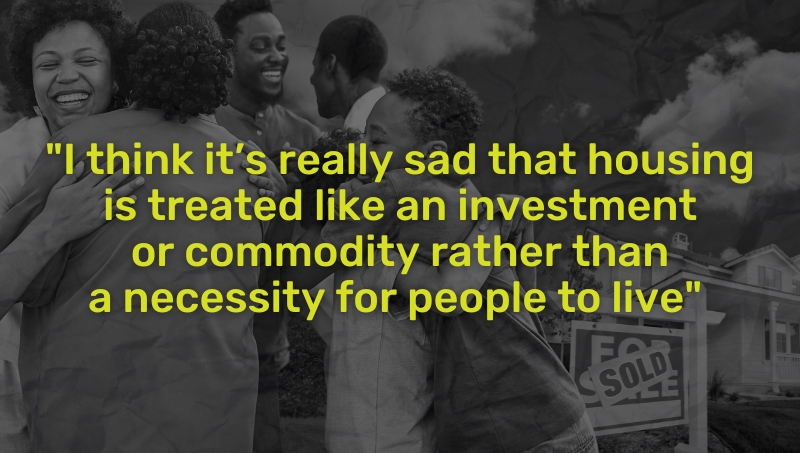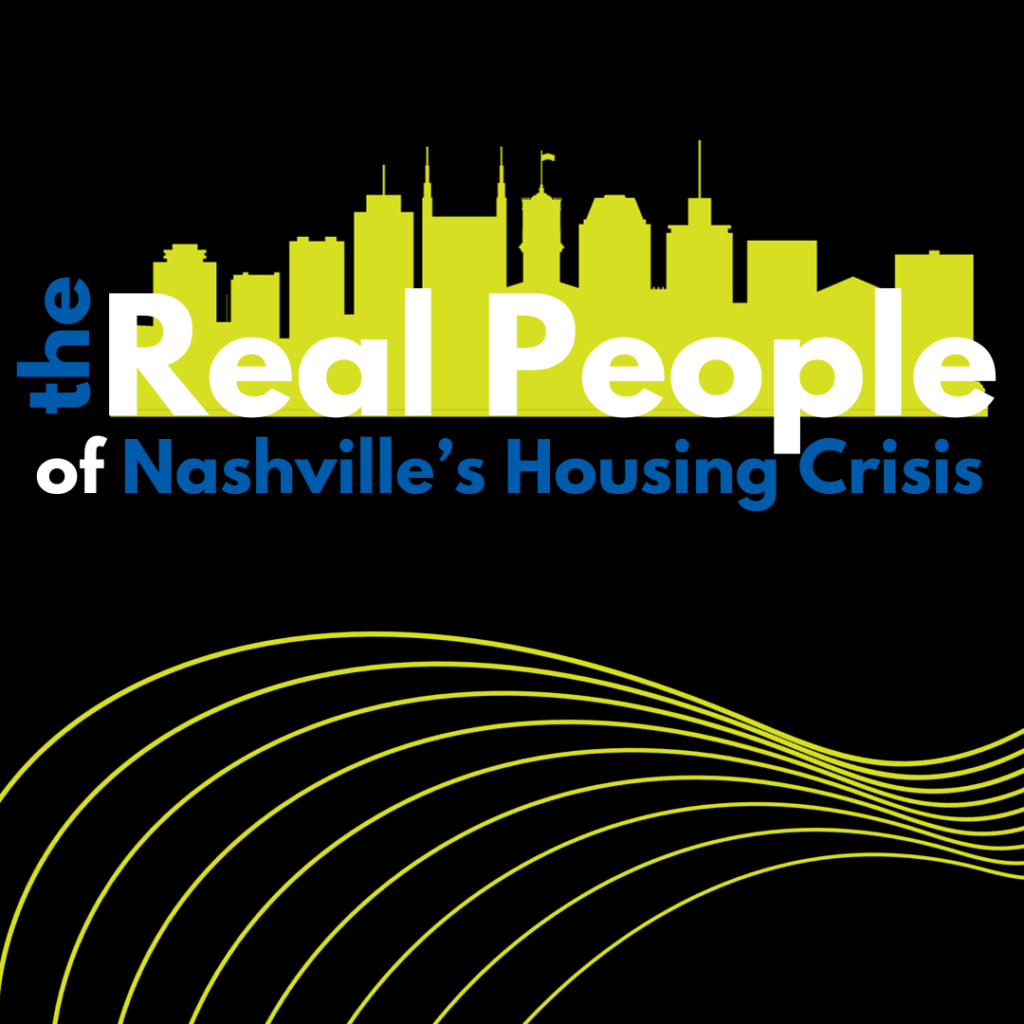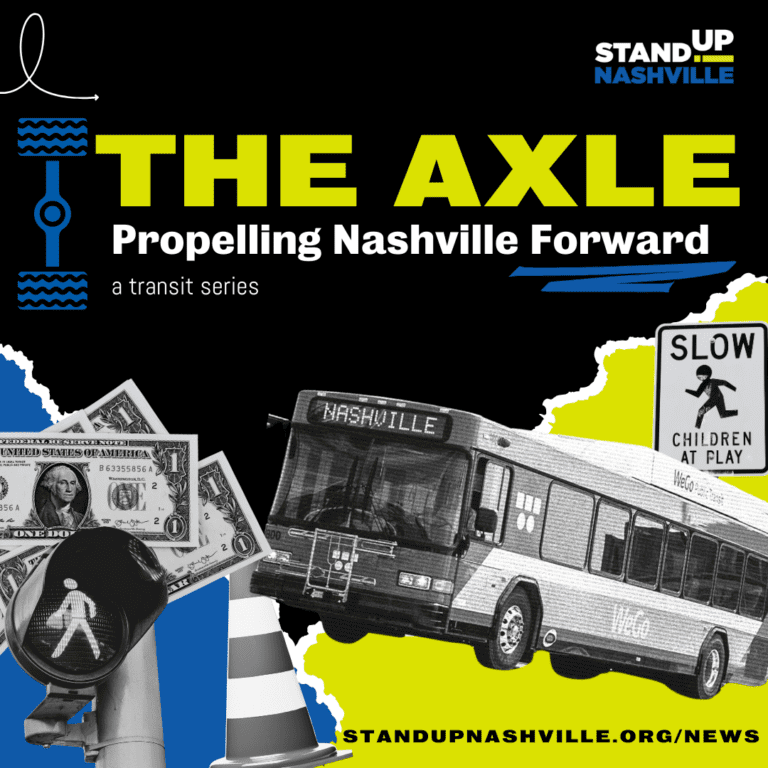While some may think that the pandemic acted as a catalyst for the current housing crisis in Nashville and across the nation, this widespread panic about housing security has been felt for far longer than the last four years.
As Stand Up Nashville continues to hold monthly meetings addressing our neighbors’ concerns and holding space for the fallout of this ongoing economic crisis, several community members were brave enough to share their personal journeys in searching for home. These are just two of many examples of how housing is impacting every area of our lives:
A Nashville Native Pushed Out – Rita Robinson:
So I am a Nashville native, and I’ve always worked in the community, providing exceptional customer service. I worked for my last employer for four years, during which time I had custody of my son throughout the pandemic. During that period, I was working for a wellness company, but I wasn’t getting much time with my boy. The bills were paid, but it was difficult to stay afloat as a single mom. Then, after two years in my apartment, I got a notice that my rent would be increasing by a lot, and I didn’t know what to do. The stress was immediate and overwhelming.
I finally was forced into making the excruciating decision of sending my son to live with his father in South Carolina, as I moved our belongings into storage and began living with a friend while I searched for new housing. The small, one-bedroom apartment I found on the outskirts of town was still $1,200, and the constant anxiety I was experiencing severely impacted my health and eventually led to my being hospitalized. I then had to take a leave of absence to try to get better and burned through my savings while recovering.
When my health improved enough that I could work again, I started a small cleaning company to try to increase my income and help other single moms in my situation. It quickly became a passion of mine, as I heard so many stories like my own, but the business didn’t take off as quickly as I’d hoped. Again, I came to a point where I was working extremely hard, but my savings were depleted because of the cost of living and my small business venture; so I was forced to move in with a retired relative.
I started collaborating with other small business owners facing the same challenges, and I’m hoping to grow my company so that I can keep helping other single moms. I never planned on living with family for this long, so I’m going to apply for a fulltime job that is third-shift so that I can work there while keeping my business going. My goal is to move out of my aunt’s house sometime in the next six months with this new revenue stream, but I don’t know if that timeline is going to work out. I’m trying to figure things out, but it’s overwhelming, especially considering my health.


It Shouldn’t Be This Hard – Isaiah Kallman:
Before I moved here 17 years ago from Michigan, I had a two-year period of time where I didn’t have stable housing. I was living with my parents, but they were struggling financially—so to help alleviate some of the burden, I lived in an empty storefront and told them I had moved in with friends so that they wouldn’t worry.
When I moved here, I had $2,000 in my pocket and didn’t know anyone. I was trying to figure it out, but I was young. Strangers were kind and let me crash on their couches sometimes, but it still took me about a month to even find a place to live. When I did, it was with two students in Sylvan Park, and our rent was $178 each a month. And that was still tough—I was still experiencing extreme poverty, but at least I had a roof over my head, a sleeping bag, and a space heater.
I was able to work and get out of that life, but I know that’s not possible for a lot of people that don’t look like me.
When I got married three years later in 2010, my wife and I lived in a duplex for $350 a month, which is obviously good by today’s standards—but still twice as much as what I had been paying. We were just barely scraping by on a combined income of $1,000 a month, and then our ceiling collapsed due to a water heater drain overflowing directly above us. Turns out, plaster is often as hard as concrete, and I got beat up pretty badly in the incident.
I just poured hydrogen peroxide on the wounds because I knew we couldn’t afford a hospital visit.
The next cheapest place we could find to live a year after that was $650 a month. I had to find another job in order to afford it.
Now, I feel like I’ve won the lottery at least six times in my life in finding livable housing, and I know not everybody is able to win the lottery six times. I’ve seen too many friends and too many neighbors struggle the way that I struggled, so the issue of affordable housing is deeply important to me. I think it’s really sad that housing is treated like an investment or commodity rather than a necessity for people to live. Just because you’ve had a couple of bad breaks or you don’t look like I do, it shouldn’t be this hard. It was hard enough for me, and I’ve got a lot going for me: I am an approachable, privileged, white, able-bodied man. If it has been this difficult for me, what are other people going through?







